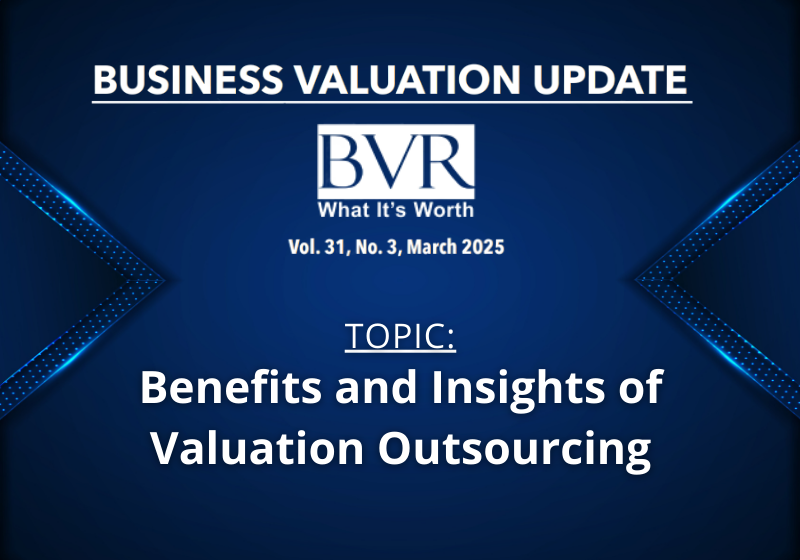
We are excited to share that our Director’s article has been featured in Business Valuation Resources (BVR). This piece stems from engaging conversations at a recent conference, where our team had the opportunity to connect with BVR and discuss the growing role of offshoring in the valuation profession. The article offers practical insights and real-world experiences from our work with CPA firms, investment banks, and valuation practices across the U.S.
As the demand for valuation engagements continues to grow and the availability of skilled talent in the U.S. is declining, valuation firms in the U.S. are increasingly looking toward an outsourcing model to enhance their capabilities, streamline operations, and improve efficiency. In this article, we will explore the ins and outs of valuation outsourcing, with a specific focus on the advantages and disadvantages of working with offshore providers and the various outsourcing models available. What can be outsourced?
Professionals in countries outside the U.S. have the necessary skills and experience to cater to the valuation requirements for a variety of purposes, including but not limited to:
- IRC 409a and ASC 718
- ESOPs
- Gift and Estate
- Purchase Price Allocation
- Goodwill Impairment
- Portfolio Valuation
- Embedded Derivatives (including Monte Carlo simulation)
- Discount Studies
- Litigation Support
- Fairness and Solvency Opinions
- Real Estate and Tangible Assets
Countries to Consider
India stands out as a leading destination to offer valuation outsourcing, with other countries, such as the Philippines and Mexico, following suit. This is primarily due to the accessibility of India’s skilled talent pool, robust IT infrastructure, cultural adaptability, and favorable government support. Valuation outsourcing in India has gained traction over the past 15 years, with companies like the Big Four, RSM, BDO, Grant Thornton (GT), Kroll (formerly Duff & Phelps), and several more establishing their global capability centers (GCC) alongside third-party providers like Knowcraft Analytics. Professionals in these third-party firms often possess advanced degrees (such as an MBA) and recognized credentials, such as Chartered Financial Analyst (CFA), Accredited Senior Appraiser (ASA), and Certified Valuation Analyst (CVA).
Outsourcing Models
There are two overall models for outsourcing to an offshore location:
- Global Capability Centers (GCC): GCC, or “captive center,” is an offshore unit fully owned by a company to perform business functions in a lower-cost region, leveraging talent and cost efficiencies. India, the Philippines, Eastern Europe, and Latin America have emerged as attractive destinations for GCCs due to their competitive advantages. India plays a significant role in the global GCC landscape. Financial services such as Big Four audit firms, RSM, BDO, GT, JP Morgan Chase, Bank of America, and Goldman Sachs employ thousands of professionals at their GCCs in India. While GCCs provide greater operational control over offshore teams, they are most viable for large enterprises with the resources to establish and manage a dedicated workforce, get regulatory approvals, handle local laws and tax regulations, and set up real estate and IT infrastructure in another country. Industry experts recommend this model for organizations planning to build offshore teams of at least 200 employees.
- Third-party Providers: This model is often the preferred solution for small and medium-sized firms due to reduced capital expenditures, lower operational costs, and access to specialized expertise. As a result, stand-alone valuation firms or valuation departments under CPA/consulting firms may find third-party outsourcing solutions more cost-effective and suitable to meet their requirements.
When selecting a third-party provider for valuation outsourcing, consider the following key factors:
- Core Competence: Choose firms whose primary focus is valuations, and it is recommended to consider offshore providers with a dedicated team of at least 50 professionals or more specializing in valuations;
- Experience: Prioritize third-party providers with a proven track record in your specific valuation needs and at least a decade of industry experience
- References: Seek feedback from current and past clients to assess service quality and reliability
- Data Security: Ensure the provider has robust data security measures and holds certifications such as ISO 27001
- U.S. Presence: Opt for firms with a legal entity and representative in the U.S. to enhance accessibility and compliance.
Expert Offshore Advisory, On-Demand.
Gain access to top-tier financial expertise without the overhead. Our outsourced advisory services help you navigate challenges and drive strategic growth.
Talk to Our Experts Today!
Staffing and Pricing Models
There are three options to consider in terms of staffing and pricing:
- Full-time equivalent (FTE): Using FTEs, there are dedicated professionals assigned to your firm. It can be structured as either: (1) a fixed monthly USD rate model where pricing varies based on the required skill set and level of experience; or (2) a cost-plus model where pricing is based on the total employee compensation paid by the vendor, plus overhead and a markup. Advantages: Provides budget predictability and flexibility to allocate the team across various tasks. It allows U.S. firms to reward and retain high-performing individuals. Disadvantages: Fixed costs limit the ability to scale resources up or down during peak or slow periods. Additionally, there is no direct control over retaining or incentivizing high-performing individuals, as they remain employed by the vendor. Best suited for: Firms with a consistent workflow and seeking greater control over employee retention and incentives.
- Variable Pricing Model: Under this model, pricing is structured based on either: (1) time and expenses (hourly rate); or (2) a fee per project. Advantages: Eliminates fixed monthly costs and allows for flexibility in scaling resources based on workload fluctuations. Disadvantages: A dedicated team may not be assigned, potentially impacting consistency. Additionally, this model may be costlier compared to the FTE or cost-plus models. Best suited for: Firms with inconsistent workflow patterns, varying skillset requirements across projects, and a need for maximum flexibility.
- Hybrid Model: This model combines the FTE model with a variable pricing model. Advantages: Ensures predictable workflow delivered through the FTE model while accommodating peak demand with variable pricing. Disadvantages: Implementation can be challenging if delivery overlaps between FTE and non-FTE teams. Best suited for: Firms with fluctuating demand during peak seasons or those requiring niche skills for irregular projects.
Pros and Cons
The question of “should you outsource” will inevitably come up, so the pros and cons should be considered. The pros include:
- Flexibility: During periods of volatility, businesses can scale valuation services up or down as needed, avoiding the risks associated with hiring, retaining, and managing full-time staff in the U.S.
- Reduced Turnaround Time: Outsourcing to regions like India, which is nine to 12 hours ahead of the U.S., companies can achieve continuous workflows, where tasks assigned at the end of the U.S. workday can be completed overnight and ready for review the next morning.
- Talent Availability: India offers a vast pool of highly skilled professionals well-versed in U.S. valuation standards, valuation guidance, and best practices that align with USPAP and SVSS. Professionals in India possess global accreditation certifications like CVA, ABV, ASA, and CFA.
- Cost Savings: Outsourcing can generate cost savings of up to 40%, providing a significant competitive advantage.
Of course, there are also disadvantages to consider, but there are action items to mitigate them, including:
- Quality Control: Different vendors may provide work of varied quality, which is a major concern for most firms. U.S. companies can participate in the hiring process if they believe it’s necessary. The U.S. companies should select an outsourcing provider with a proven track record of successfully executing projects in business valuation—ideally, ones from reputable companies. Additionally, having a robust quality control program reduces the risk.
- Data Security: Outsourcing sensitive data might be unsafe. U.S. companies should prioritize vendors that are ISO-compliant and/ or have been vetted by U.S.-based large financial institutions, ensuring greater security and peace of mind when transferring data overseas.
- Time-zone Issues: The difference in time zones can create communication and collaboration challenges that increase the potential for delays in real-time decision making and urgent responses. Additionally, ineffective communication or collaboration can lead to misunderstandings and misaligned expectations, impacting the quality of the work product and the deadlines. Establishing regular touchpoints is crucial for maintaining transparency and trust, particularly in the early stages of an outsourcing engagement. Frequent discussions help address progress, share feedback, and resolve issues before they escalate. Over time, communication frequency may adjust, but keeping an open dialogue is essential for long-term success.
- Political and Economic Instability: Shifts in laws, regulations, economic conditions in the offshore country, or ties between the U.S. and the offshore country can affect outsourcing arrangements. Companies should proactively monitor global and local policy changes to address potential challenges in advance. Countries with favorable ties with the U.S. should be preferred.
The accompanying sidebar includes some observations by valuation practitioner Joe Orlando (Exit Strategies), who has had over 20 years of experience with outsourcing and offshoring.



